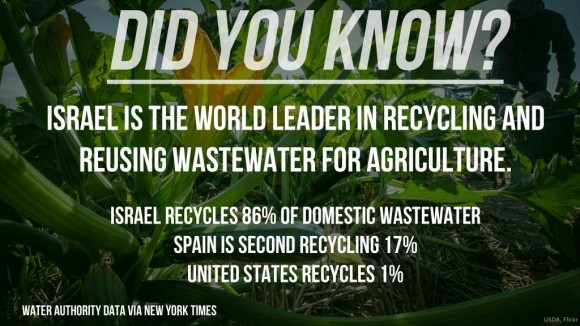The de facto hasbara alliance between the New York Times and the Israeli government just made a blunder, revealing complicity and ineptness on both their parts.
Yesterday we jumped on the staggering service that the New York Times had performed for the Israeli government, when the paper published a front-page article saying Israel has solved its water issues — without mentioning that much of that water is taken from Palestinians, whose use of water is highly restricted.
Well, it didn’t take long for the Israeli Embassy to tweet the image above. Mission accomplished! As we observed recently, the Times has evidently made an editorial decision to be a weapon for Israel in the hasbara wars — “hasbara” is Hebrew for propaganda.
And it didn’t take long for the New York Times to tweet an image for the story either: of young men in a pool.
A water revolution in Israel has allowed the country to overcome any threat of drought http://t.co/TV38Pzc6gQ pic.twitter.com/xPMroIgX8o
— The New York Times (@nytimes) May 30, 2015
Just one problem. That pool is not in Israel. It’s in the occupied West Bank, and it’s Palestinian. According to the Times’s own caption on the Uriel Sinai photo in its slideshow:
Palestinians swam in spring water at Ein Mabu’a in the West Bank. Israel, which shares an aquifer with the West Bank, says it provides the Palestinians with more water than it is obliged to under the existing peace accords. The Palestinians say it is not enough and too expensive. A new era of water generosity could help foster relations with the Palestinians and with Jordan.
And just one other problem. In a 2011 report on “Dispossession and Exploitation”, B’Tselem, the highly-respected Israeli human rights organization, describes the spring as an exploited Palestinian site, inside the occupied Ein Prat Nature Reserve.
In August 1967, shortly after its occupation of the West Bank, Israel began to generate income from the nature, tourist, and vacation sites in the northern Dead Sea area, and around Jericho and the Dead Sea shores. Israel does not presently deny Palestinians access to these sites, but few Palestinians visit them…
Since the 1970s, the [Ein Prat] reserve has been managed by the Nature and Parks Authority, which collects an entry fee of NIS 20 for an adult. In 2009, it had 73,340 visitors. The Authority plans to collect an additional fee for access to one of the reserve’s main springs, Ein Fuar (Ein Mabu’a), adjacent to the Allon settlement. The Separation Barrier is planned to be built inside the reserve, on the southern bank of the Fara (Prat) Stream. The plan is now frozen. If implemented, it would irrevocably damage the site’s landscape and ecology
Shouldn’t the New York Times be telling its readers about these stolen resources?



The rule is, once Israel takes something, it is no longer Palestinian, so no problem.
PS re James North on taking Palestinian water; I should have included this link to WaPo, in which Naftali Bennett explains it all.
I suspect that the same rule explains how the Israeli reporter interviewed on NPR recently asserted that there are no roads from which Palestinians are excluded. I infer that she meant no roads in Palestinians territory. Roads to settlements from which Palestinians are excluded must evidently be considered part of Israel, and hence not available to Palestinians by definition.
http://www.washingtonpost.com/opinions/israels-naftali-bennett-i-dont-believe-in-giving-up-our-land/2015/05/29/0817d096-04f7-11e5-bc72-f3e16bf50bb6_story.html?hpid=z3
Sewage treatment is the process of removing contaminants from wastewater, primarily from household sewage. It includes physical, chemical, and biological processes to remove these contaminants and produce environmentally safe treated wastewater (or treated effluent).
Too bad Israel has not figured out how to remove the contaminate named “Ziocaine” , or maybe the water delivery system is how they feed ziocaine to the masses.
“Israel is a world leader in recycling and reusing wastewater for agriculture”
as the settlers dump their wastewater on palestinian villages flooding and contaminating their fields!
https://www.youtube.com/watch?v=_xoe2YJfRNA
more here: https://mondoweiss.mystagingwebsite.com/2014/02/without-telling-readers
According to International Law, the occupant [the Israeli military Commander] is not allowed to exploit the occupied territory for the benefit of the home economy. He must 1. look after the needs of the military whilst 2. Look to benefit the needs of the local protected population, not the settlers obviously, since according to article 4 of the Geneva Conventions they are not protected persons. (1) The Israeli high court of justice ruled that The Hague regulations prohibit the exploitation of resources of occupied territory for the economic needs of the occupying country. “The military commander may not weigh national, economic, or social interests of his country in so far as they have no ramifications on his security interest in the area, or on the interest of the local population. Even military needs are his (i.e. the military commander’s) needs and not national security needs in the broad sense. Territory held in belligerent occupation is not an open field for economic or other kinds of exploitation” [HCJ 393/92 Teachers Housing Cooperative V Commander of IDF forces. Honourable justice A Barak 1983].
(2) The Israeli state attorney’s office relied on this principle in its response to the petition The Ma’ale Adumin Municipality filed to exempt it from paying for burying Palestinian waste in the Abu Dis waste-disposal site:
It is absolutely clear that the powers specified in Article 55 too are subject to the fundamental principal involving the powers of the military commander in territory that is subject to belligerent occupation, as appears from Article 43 (Hague 1907) whereby the area is not an open field for economic exploitation. Therefore the entire authority of the military commander in the region is exercised for security interests or for civilian needs of the population living in the territory, and this includes also the authority under Article 55.